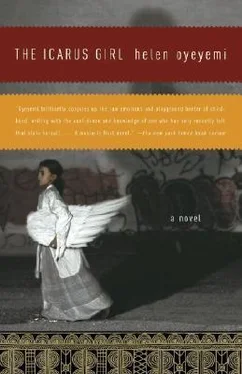TillyTilly smiled, and there was a bewildering moment of blur between her and would-have-been-could-have-been Tilly, the wise-eyed ibeji woman, who wasn’t actually there, couldn’t be there at the same time as TillyTilly.
“No, not that. It’s like. . You know when we fell?”
Jess remembered the flying-sinking feeling and nodded.
“It’s like that,” Tilly whispered, smoothing out her skirt with her trembling hands. Big tears were falling from her eyes again.
“It’s not what’s supposed to happen. Something’s wrong. I can’t—”
Jess watched as Tilly’s lips moved noiselessly for a few moments, as if she had forgotten how to speak, or what the words were. With effort, she met Jess’s eyes and said, “If only you could speak Yoruba. Or understand it.”
Jess reached out and timidly touched Tilly’s hand. “I’m sorry that I can’t, TillyTilly. Can’t you teach me?”
She wanted to be a better sister, too, but she didn’t think she could ask Tilly about that.
“Jess!”
Astonished, Jess gazed upwards to find that she was kneeling teary-eyed in the living-room doorway, at her mother’s slippered feet.
“What’s the matter?” Sarah asked, equally surprised.
Jess opened and closed her mouth, then gave a little laugh and moved aside so that her father, sock-footed and carrying a plate with a sandwich on it, could reenter the sitting room. Both her parents looked at her expectantly. With growing disbelief, Jess yet again felt herself slipping into the gap — that gap of perception between what is really happening to a person and what others think is happening. She stood up and said, lamely, “I hurt myself.”
“Where? Shall I take a look at it?” Her mum maintained steady eye contact with her, and Jess, disturbed, wondered if the gap was not as wide as she had thought it was. She couldn’t bear a halfway gap; it had to be a chasm or not there at all — fitting pieces together would be dangerous and doomed to misunderstanding.
“No, I only stubbed my toe, it’s all right now,” she said, quickly.
“Jess, d’you want some of this?” Daniel interrupted from the sofa, apparently under the impression that Jess wanted to eat something as boring as ham and cheese in a sandwich.
Jess was relieved when Sarah’s eyes slid off her towards him.
“I like the way you’re eating ham now when I’m doing a ham thing for dinner,” Sarah admonished.
As her father replied, Jess tried to creep past her mother. She was stopped by a tug at the beaded end of one of her cornrows.
“Hey, you. It’s nearly half past six, and you haven’t asked to phone Shivs yet! You two arguing or something?”
Jess hesitated, then shook her head. She still had to sort that out.
“Actually. . can I use the phone?”
Her mum nodded, and Jess bolted up the stairs to her bedroom to find the purple address book.
Shivs was a long time coming to the telephone, and when she finally took the call, her voice was gruff.
“What?”
“Shivs, I’m really sorry about yesterday.”
“So?”
“So I’m sorry! You should accept my apology. Jesus, what d’you want from me?”
“Don’t take the Lord’s name in vain,” Shivs said automatically, as Jess had known she would, then they both collapsed into laughter. Finally, Shivs drew a breath and then asked, “What happened, anyway?”
Jess bit her lip. “Umm. . well, I was just joking. I didn’t even mean it! I was about to say ‘jokes,’ but then my dad’s friend Jonathan made me jump and I dropped the phone, and when I’d picked it up you’d gone.”
Shivs gasped, apparently at the audacity of the lie. “Ohhhh, what’s WRONG with you, Jessamy Harrison! The truth shall set you free — I heard you breathing!”
“What’s all this Bible stuff, anyways?” Jess asked, buying time. What on earth was she supposed to say now? And she was already so worried about TillyTilly, who was not supposed to be sick.
“My mum made me go to church on Sunday. Dry as a bone. Jesus was some boring man, but still, I DID hear you breathing— it was like huhhh, huhhhh, huuuuh —”
Jess, having swiftly made up her mind, interrupted her. “All right, listen, I’ll tell you about it one day. All I can say about it now is that I’m really sorry and I didn’t mean it.”
“Yeah? Tell me one day like when?”
“Like. . not now.”
“Oh, fine then, if you want to be all mysterious,” Shivs said, then: “Me and Katrina are best friends again — we made up today.” They’d had a fight over one of Katrina’s Barbie dolls, which was now missing a pink-plastic high heel, an occurrence that Shivs swore (wet and dry, stick a needle in her eye, if this turns out to be a lie) wasn’t her fault.
“Oh.”
“But me and you are still best friends. It’s just Katrina’s my school best friend, OK?”
“OK!” Jess didn’t complain, even though she didn’t have a school best friend herself.
“I’ve got to go and eat my dinner now,” Shivs said.
Jess could faintly hear Mrs. McKenzie calling in the background.
“All right. Bye.”
“Bye,” Shivs said cheerily. “I’m glad we made up. I didn’t take the friendship bracelet off, not even in the bath! And it took AGES making yours.”
After Jess had finished using the phone, her mum called Nigeria and spoke to Jess’s grandfather. Jess, sitting patiently on the steps waiting for her turn and bracing herself for the usual fear-provoking sound-echo on the line, pricked her ears up when she heard her mother mention the word ibeji , then look at her and turn away slightly before continuing in rapid Yoruba. She hadn’t talked with her mum about the issue of the ibeji statue for Fern again, preferring to keep it quietly in her mind for now while she worked out exactly how it was supposed to make Fern happy. When her mother finally stopped speaking and passed the phone to her saying, “There’s only a few minutes left on the card,” Jess spoke eagerly into the receiver.
“Hello, Grandfather!”
“My Wura! How are you, how is everything?”
She grimaced at the echo.
“I’m all right!”
“Good girl! Fine daughter!”
Jess smiled at a man who would say that she was a fine daughter just for being all right. Her grandfather’s next words made her heart stand still.
“Eh-heh, and also, have you heard from your friend?”
Jess’s eyes widened and she sank down on the bottom step of the staircase and looked through into the kitchen at her mother, who was slicing onions at the chopping board.
“Friend? Which friend? I mean. . um. I do have friends, but which one. .?”
“Ha! You this girl! Have you forgotten already? That thief friend of yours who was stealing my candles and taking them to my own Boys’ Quarters,” her grandfather said equably.
Jess was silent, and the muteness wasn’t just inside her, but everywhere at once.
“Akin said that you came out of the Boys’ Quarters that day when you wanted to go home. Sae you remember?”
“Yes,” Jess whispered.
“I told him to check the place, but that foolish boy just went to the front steps and came back to tell me it was nothing. I checked the whole place myself a few days ago.”
“I didn’t have a friend there,” Jess said weakly.
“Eh-heh now, so you didn’t have a friend there! You were crying to go home and then afterwards you didn’t want to leave. You oyinbo are strange,” he teased.
Jess put a hand over her mouth so that he didn’t hear her laborious breathing. Had he found the board with the ibeji woman on it? He couldn’t have. He would have said something. But if Tilly had taken it away, then where was it?
Читать дальше












